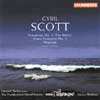Scott, C Symphony No 3, 'The Muses'; Piano Concerto No 2; Neptune
The warmest of welcomes for a remarkable discovery in 20th-century British music
View record and artist detailsRecord and Artist Details
Composer or Director: Cyril (Meir) Scott
Genre:
Orchestral
Label: Chandos
Magazine Review Date: 6/2004
Media Format: CD or Download
Media Runtime: 80
Mastering:
Stereo
DDD
Catalogue Number: CHAN10211

Tracks:
| Composition | Artist Credit |
|---|---|
| Symphony No 3 'The Muses' |
Cyril (Meir) Scott, Composer
BBC Philharmonic Orchestra Cyril (Meir) Scott, Composer Huddersfield Choral Society Martyn Brabbins, Conductor |
| Concerto for Piano & Orchestra No 2 |
Cyril (Meir) Scott, Composer
BBC Philharmonic Orchestra Cyril (Meir) Scott, Composer Howard Shelley, Piano Martyn Brabbins, Conductor |
| Neptune |
Cyril (Meir) Scott, Composer
BBC Philharmonic Orchestra Cyril (Meir) Scott, Composer Martyn Brabbins, Conductor |
Author: Peter Dickinson
The work of Cyril Scott was cruelly neglected during the last decades of his life. Matters have barely improved since his death in 1970 but here are of some of his most substantial works for the 125th anniversary of his birth. John Ogdon recorded the two piano concertos (a Lyrita LP which ought to have been reissued long ago) and several orchestral works came out on Marco Polo (7/94 – nla). Scott allied himself with the Continental avant-garde in his early works and continued to write in a distinctive, personal idiom. His versatility was amazing. He studied in Frankfurt along-side Quilter and Grainger; his music was prominently performed in Germany and England; he became known for precisely crafted short piano pieces; he translated poems by Stefan George and Baudelaire and published four volumes of poetry himself; he also wrote plays and books on occultism and alternative medicine.
This dazzling creative diversity should not be allowed to detract from Scott’s remarkable music, impressively represented here by two works from the mid-1930s and the second Piano Concerto of 1958. The sumptuous scoring of the four-movement Symphony No 3 stems from Debussy and Scriabin and has common ground with Delius and Bax. The use of a chorus in the finale recalls Ravel’s Daphnis but, like Frank Bridge, Scott has his own type of English romanticism.
Neptune was originally a tone-poem based on the Titanic disaster but in a revised version two years later Scott made his programmatic depiction less obvious. The large orchestra, including wind-machine and organ, delivers oceans of sensational sea music followed by episodes of menace, then a funeral march in a kind of arctic wasteland as the vision of the upended Titanic fades into the depths.
Scott has always had an acute feeling for sensuous harmony and by the time of the Second Piano Concerto his use of chords was almost as consistent as Messiaen’s. In all three works Martyn Brabbins has total control of the music’s ebb and flow and Howard Shelley is, as usual, an impeccable soloist. Overall, this release represents a remarkable discovery in 20th-century British music: excellent recording, too.
This dazzling creative diversity should not be allowed to detract from Scott’s remarkable music, impressively represented here by two works from the mid-1930s and the second Piano Concerto of 1958. The sumptuous scoring of the four-movement Symphony No 3 stems from Debussy and Scriabin and has common ground with Delius and Bax. The use of a chorus in the finale recalls Ravel’s Daphnis but, like Frank Bridge, Scott has his own type of English romanticism.
Neptune was originally a tone-poem based on the Titanic disaster but in a revised version two years later Scott made his programmatic depiction less obvious. The large orchestra, including wind-machine and organ, delivers oceans of sensational sea music followed by episodes of menace, then a funeral march in a kind of arctic wasteland as the vision of the upended Titanic fades into the depths.
Scott has always had an acute feeling for sensuous harmony and by the time of the Second Piano Concerto his use of chords was almost as consistent as Messiaen’s. In all three works Martyn Brabbins has total control of the music’s ebb and flow and Howard Shelley is, as usual, an impeccable soloist. Overall, this release represents a remarkable discovery in 20th-century British music: excellent recording, too.
Discover the world's largest classical music catalogue with Presto Music.

Gramophone Digital Club
- Digital Edition
- Digital Archive
- Reviews Database
- Full website access
From £8.75 / month
Subscribe
Gramophone Full Club
- Print Edition
- Digital Edition
- Digital Archive
- Reviews Database
- Full website access
From £11.00 / month
Subscribe
If you are a library, university or other organisation that would be interested in an institutional subscription to Gramophone please click here for further information.




